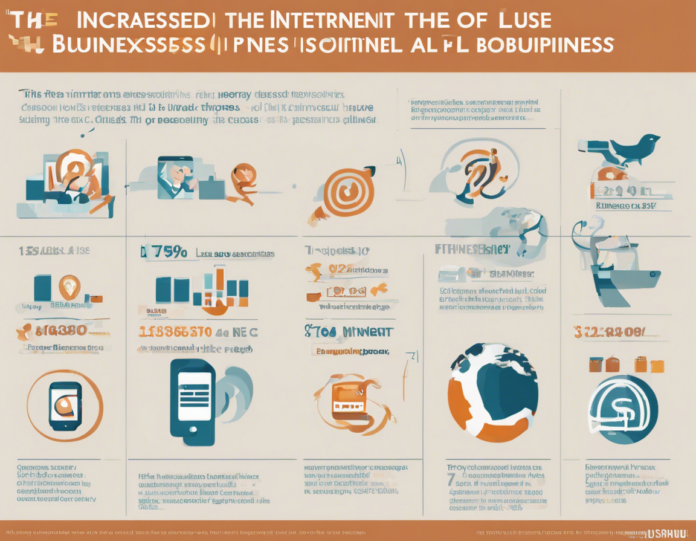The rapid expansion and evolution of the internet over the past few decades have revolutionized the way businesses operate. From small local enterprises to multinational corporations, businesses are leveraging the online potential to reach new markets, engage with customers, streamline operations, and drive growth. This comprehensive guide explores how businesses are benefiting from the internet expansion and offers insights into the strategies and tools that can help organizations thrive in the digital age.
The Power of Online Presence
In today’s digital landscape, having a strong online presence is crucial for businesses of all sizes. A well-designed website serves as the hub of a company’s online presence, providing customers with information about products and services, contact details, and the ability to make purchases or inquiries. Search engine optimization (SEO) plays a key role in driving traffic to websites, ensuring that businesses are visible to potential customers searching for relevant products or services.
Key Takeaways:
- Online presence is essential for businesses to reach and engage with customers.
- Websites serve as the central hub of a company’s online presence.
- SEO helps businesses improve their visibility in search engine results.
E-Commerce and Online Sales
One of the most significant ways businesses are benefiting from the internet expansion is through e-commerce. Online shopping has transformed the retail landscape, enabling businesses to reach global markets and operate 24/7. E-commerce platforms such as Shopify, WooCommerce, and Magento provide businesses with the tools to set up online stores, process payments securely, and manage inventory efficiently.
Key Takeaways:
- E-commerce has opened up new revenue streams for businesses.
- Online sales allow businesses to reach a global customer base.
- E-commerce platforms simplify the process of setting up online stores.
Digital Marketing Strategies
Digital marketing is another area where businesses are harnessing the power of the internet expansion. Social media marketing, email campaigns, content marketing, and pay-per-click advertising are just a few of the strategies businesses are using to reach and engage with their target audience. Tools such as Google Analytics and social media management platforms help businesses track the performance of their digital marketing efforts and make data-driven decisions to optimize results.
Key Takeaways:
- Digital marketing is essential for businesses to promote their products and services online.
- Social media and email campaigns are effective ways to engage with customers.
- Analytics tools help businesses measure and analyze the performance of their digital marketing campaigns.
Remote Work and Collaboration
The internet expansion has also facilitated the rise of remote work and online collaboration. Cloud-based tools such as Google Workspace, Microsoft Teams, and Slack allow employees to communicate, collaborate, and work together from anywhere in the world. This flexibility not only increases productivity but also opens up new opportunities for businesses to hire top talent regardless of their location.
Key Takeaways:
- Remote work tools enable employees to work from anywhere.
- Online collaboration platforms facilitate communication and teamwork.
- Cloud-based tools make it easy for employees to access files and information remotely.
Cybersecurity and Data Privacy
While the internet offers numerous benefits to businesses, it also comes with risks, particularly in terms of cybersecurity and data privacy. Cyberattacks such as phishing, ransomware, and data breaches can have devastating consequences for businesses, ranging from financial losses to reputational damage. Implementing robust cybersecurity measures, such as firewalls, antivirus software, and employee training, is essential to protect sensitive data and safeguard business operations.
Key Takeaways:
- Cybersecurity is a critical concern for businesses operating online.
- Data breaches can have serious implications for businesses.
- Cybersecurity measures such as firewalls and antivirus software help protect against online threats.
Harnessing the Internet of Things (IoT)
The Internet of Things (IoT) presents businesses with new opportunities to streamline operations, improve efficiency, and deliver personalized customer experiences. IoT devices such as smart sensors, wearables, and connected appliances collect and transmit data, enabling businesses to gather insights, automate processes, and enhance decision-making. Industries such as manufacturing, healthcare, and retail are leveraging IoT technologies to optimize operations and drive innovation.
Key Takeaways:
- IoT devices enable businesses to collect and analyze data in real time.
- IoT technologies can help businesses improve efficiency and enhance customer experiences.
- Industry-specific applications of IoT are transforming various sectors.
The Future of Online Business
As technology continues to evolve and the internet expands further, the future of online business holds endless possibilities. Artificial intelligence, virtual reality, blockchain, and 5G connectivity are just a few of the technologies shaping the digital landscape and offering new avenues for businesses to innovate and grow. By staying informed about emerging trends and investing in digital capabilities, businesses can position themselves for success in an increasingly connected world.
Frequently Asked Questions (FAQs)
1. How can businesses improve their online visibility?
To improve online visibility, businesses can invest in search engine optimization (SEO), create high-quality content, engage with customers on social media, and consider online advertising.
2. What are the advantages of using e-commerce platforms?
E-commerce platforms simplify the process of setting up online stores, offer secure payment processing, provide inventory management tools, and enable businesses to reach a global customer base.
3. How can businesses protect themselves from cyberattacks?
Businesses can protect themselves from cyberattacks by implementing cybersecurity measures such as firewalls, antivirus software, regular software updates, employee training on security best practices, and data encryption.
4. How can businesses leverage IoT technologies?
Businesses can leverage IoT technologies to collect and analyze real-time data, automate processes, monitor equipment performance, track inventory, and deliver personalized customer experiences.
5. What are some emerging technologies shaping the future of online business?
Emerging technologies such as artificial intelligence, virtual reality, blockchain, 5G connectivity, and edge computing are shaping the future of online business by enabling new levels of automation, personalization, and connectivity.
In conclusion, businesses across industries are reaping the benefits of the internet expansion by embracing online presence, e-commerce, digital marketing, remote work, cybersecurity, IoT, and emerging technologies. By harnessing the power of the internet and staying ahead of digital trends, businesses can position themselves for sustained growth and success in the ever-evolving digital landscape.


Recent comments